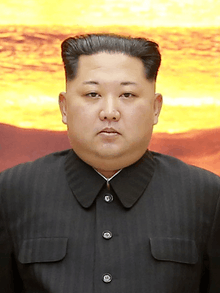Chairman of the State Affairs Commission
| Chairman of the State Affairs Commission of the Democratic People's Republic of Korea
조선민주주의인민공화국 국무위원회 위원장 | |
|---|---|
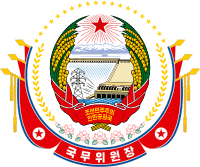 Emblem of the Chairman of the State Affairs Commission of the Democratic People's Republic of Korea | |
 Flag of the Chairman of the State Affairs Commission of the Democratic People's Republic of Korea | |
| Style |
Various titles (Within the DPRK) His Excellency (International correspondence) |
| Residence | Ryongsong Residence |
| Appointer | Supreme People's Assembly |
| Term length | Five years |
| Constituting instrument | Constitution of the Democratic People's Republic of Korea |
| Precursor | Chairman of the National Defence Commission |
| Inaugural holder | Kim Jong-un |
| Formation | 29 June 2016 |
| Chairman of the State Affairs Commission | |
| Chosŏn'gŭl | 조선민주주의인민공화국 국무위원회 위원장 |
|---|---|
| Hancha | 朝鮮民主主義人民共和國國务委員會委員長 |
| Revised Romanization | Joseon minjujuui inmin( )gonghwaguk gukmu wiwonhoe wiwonjang |
| McCune–Reischauer | Chosŏn minjujuŭi inmin'gonghwaguk kukmu wiwŏnhoe wiwŏnjang |
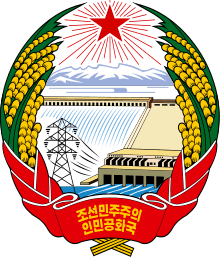 |
|---|
| This article is part of a series on the politics and government of North Korea |
|
|
|
Related topics |
The Chairman of the State Affairs Commission of the Democratic People's Republic of Korea (Chosŏn'gŭl: 조선민주주의인민공화국 국무위원회 위원장) is the supreme leader of the Democratic People's Republic of Korea, according to the country's constitution. The chairman directs the State Affairs Commission, which is the supreme leadership institution in North Korea, and heads the country's armed forces as the supreme commander of the Korean People's Army. The chairman is also the head of the party as the Chairman of the Workers' Party of Korea.
History
The office originated from the position of Chairman of the National Defence Commission of the Central People's Committee of the Democratic People's Republic of Korea (Chosŏn'gŭl: 조선민주주의인민공화국 중앙인민위원회 국방위원회 위원장) that was created on 28 December 1972 along with the National Defense Commission, which at that time was a commission subordinate to the Central People's Committee. The President of the Democratic People's Republic of Korea, which at the time was Kim Il-sung was the ex officio Chairman of the National Defence Commission, as well as the Supreme Commander of the Korean People's Army, and served in the position from 28 December 1972 until 9 April 1993.
An amendment to the 1972 constitution was approved on 22 May 1992 that no longer made the President the ex officio chairman of the National Defence Commission and also the supreme commander of the Korean People's Army. The same amendment also made the National Defence Commission a separate institution from the Central People's Committee in order to become the highest military leadership organ in the country. This amendment allowed for Kim Jong-il to be elected as Chairman of the National Defense Commission of the Democratic People's Republic of Korea (Chosŏn'gŭl: 조선민주주의인민공화국 국방위원회 위원장) on 9 April 1993 following his appointment as supreme commander of the Korean People's Army on 24 December 1991.
Following Kim Il-sung's death on 8 July 1994, another amendment to the 1972 constitution was approved on 5 September 1998 that made the National Defense Commission into the highest military leadership and management institution, which effectively made it the highest decision-making body in North Korea. The amendment also abolished the position of President after enshrining Kim Il-sung as the country's eternal President. The amendment stipulated that the chairman of the National Defense Commission commands the entire armed forces and guides national defense. It effectively made the chairman of the National Defense Commission as the most powerful official in the country despite the amendment not stating it as such.
Another amendment to the 1972 constitution that was approved on 9 April 2009 that stated that the chairman of the National Defense Commission is the "supreme leader" of the country. The amendment also specified the powers of the chairman of National Defence Commission, such as guiding overall state affairs, appointing or dismissing national defense sector cadres, ratifying or abrogating treaties, granting of pardon, and declaring state of emergency or state of war, which were previously powers given to the National Defense Commission as a whole.
Kim Jong-il served as the chairman of the National Defence Commission from 9 April 1993 until his death on 17 December 1991. His death led to another amendment to the 1972 constitution being approved on 13 April 2012 that enshrined Kim Jong-il as the eternal Chairman of the National Defence Commission of the Democratic People's Republic of Korea (Chosŏn'gŭl: 조선민주주의인민공화국 영원한 국방위원회 위원장), and allowed his son Kim Jong-un to succeed him as First Chairman of the National Defence Commission of the Democratic People's Republic of Korea (Chosŏn'gŭl: 조선민주주의인민공화국 국방위원회 제1위원장).
Kim Jong-un served as first chairman of the National Defence Commission from 13 April 2012 until 30 June 2016, when an amendment to the 1972 constitution was approved that created the State Affairs Commission that replaced the National Defence Commission as the highest decision-making body in the country. This same amendment also created the present office of the Chairman of the State Affairs Commission to which Kim Jong-un was elected.
Powers and responsibilities
According to the Article 103 of the constitution, the Chairman of the State Affairs Commission has the following duties and authority to:
- direct the overall affairs of the State;
- personally guide the work of the State Affairs Commission;
- appoint or remove key cadres of the State;
- ratify or rescind major treaties concluded with other countries;
- exercise the right of granting special pardon;
- proclaim a state of emergency, a state of war and mobilization order within the country;
- organize and direct the National Defence Committee in wartime.
List of position holders
| Chairman of the National Defence Commission of the Central People's Committee of the Democratic People's Republic of Korea 조선민주주의인민공화국 중앙인민위원회 국방위원회 위원장 | |||||
|---|---|---|---|---|---|
| Chairman | Term | Election | Vice Chairman | ||
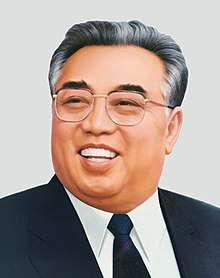 |
Kim Il-sung 김일성 1912–1994 |
28 December 1972 | 16 December 1977 | 5th SPA | O Jin-u |
| 16 December 1977 | 6 April 1982 | 6th SPA | |||
| 6 April 1982 | 29 December 1986 | 7th SPA | |||
| 29 December 1986 | 24 May 1990 | 8th SPA | |||
| 24 May 1990 | 9 April 1992 | 9th SPA | Kim Jong-il as First Vice Chairman | ||
| Chairman of the National Defence Commission of the Democratic People's Republic of Korea 조선민주주의인민공화국 국방위원회 위원장 | |||||
| Chairman | Term | Election | First Vice Chairman | ||
 |
Kim Il-sung 김일성 1912–1994 |
9 April 1992 | 9 April 1993 | 9th SPA | Kim Jong-il |
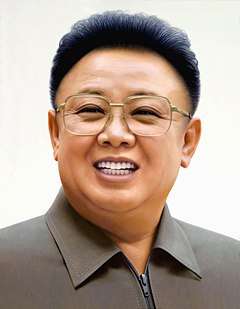 |
Kim Jong-il 김정일 1941–2011 |
9 April 1993 | 5 September 1998 | O Jin-u | |
| Vacant (25 February 1995–5 September 1998) | |||||
| 5 September 1998 | 3 September 2003 | 10th SPA | Jo Myong-rok | ||
| 3 September 2003 | 9 April 2009 | 11th SPA | |||
| 9 April 2009 | 17 December 2011 | 12th SPA | |||
| Vacant (6 November 2010–13 April 2012) | |||||
| Vacant (17 December 2011–13 April 2012) | |||||
| First Chairman of the National Defence Commission of the Democratic People's Republic of Korea 조선민주주의인민공화국 국방위원회 제1위원장 | |||||
| First Chairman | Term | Election | Vice Chairmen | ||
_(cropped).jpg) |
Kim Jong-un 김정은 born 1983 |
13 April 2012 | 9 April 2014 | 12th SPA | Kim Yong-chun Ri Yong-mu Jang Song-thaek O Kuk-ryol |
| 9 April 2014 | 29 June 2016 | 13th SPA | Ri Yong-mu O Kuk-ryol Choe Ryong-hae Hwang Pyong-so | ||
| Chairman of the State Affairs Commission of the Democratic People's Republic of Korea 조선민주주의인민공화국 국무위원회 위원장 | |||||
| Chairman | Term | Election | Vice Chairmen | ||
_(cropped).jpg) |
Kim Jong-un 김정은 born 1983 |
29 June 2016 | Present | 13th SPA | Hwang Pyong-so Choe Ryong-hae Pak Pong-ju |
